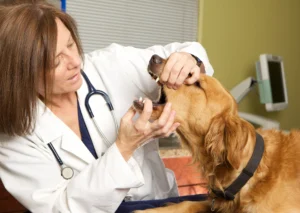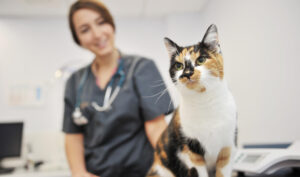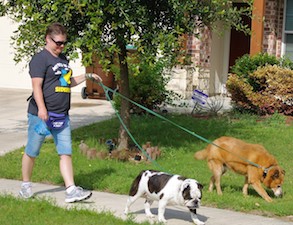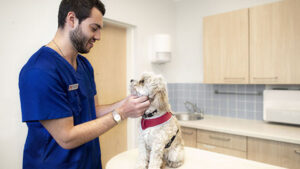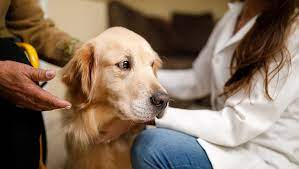Our pets, whether they are furry, feathered, or scaly, enrich our lives in countless ways. Skin diseases are only one example of the many health problems that pets, like people, can have. The condition of your pet’s skin is an excellent reflection of its general well-being and how well it is taken care of.
Table of Contents
Introduction
When pets experience skin issues, it can lead to discomfort, suffering, and distress that lowers their quality of life. As we delve deeper into our knowledge of pet skin issues, we will examine the most prevalent difficulties that pets face and offer help on how to manage and cure them.
Causes, Symptoms and Solutions for Common Skin Problems in Pets
The relationship between a person and his or her pet is one of affection, loyalty, and responsibility. It is our duty to ensure the well-being of our pets, and the condition of their skin is an important part of that. Pet skin issues are similar to those in humans, as they can vary from relatively minor annoyances to life-threatening illnesses.
Our pets are susceptible to a wide variety of skin problems, and in this article we’ll look into what causes them, how to spot the signs that something is wrong, and the best ways to cure them.
5 Main Causes of Skin Problems in Pets

Pet skin conditions are diverse. Both genetic and environmental variables can play a role in their development. The following are some of the most often cited causes of skin problems in pets:
- Heterity: Just as some human diseases can run in families, so can susceptibility to skin problems in pets. Some dog breeds may be in greater danger than others because of their hair or skin.
- Allergies: Pets can experience allergic reactions just like humans. Pollen, mold, dust mites, and even some foods can set off these allergic reactions. Itching, redness, inflammation, and even hair loss can occur in pets that are sensitive to certain allergies.
- Parasites: Common parasites that can infest a pet’s skin and cause a wide range of issues include fleas, ticks, and mites. For instance, an allergic reaction to flea bites can result in severe itching and a condition known as flea allergy dermatitis.
- Environmental Factors: Pets’ skin health can be affected by a number of environmental factors, including the conditions under which they live and play. Pet skin issues can be exacerbated by exposure to allergens or irritants, as well as by changes in humidity and temperature.
- Underlying Causes: Hormonal and immune system diseases and systemic infections are only a few examples of the underlying health problems that can appear as skin problems.
For purposes of both prevention and management, awareness of these aspects is crucial. Pet owners can take preventative measures to improve their pets’ health by learning the underlying causes of skin problems.
6 Most Common Skin Problems in Pets and Their Cure
- Allergic Dermatitis

A frequent skin disorder affecting pets, allergic dermatitis (also known as atopic dermatitis), is similar to the effects of human allergies. Similarly to humans, animals can have allergic reactions to things like pollen, mold, dust mites, and even some foods. The after-effects can include itchiness, irritation, and even hair loss. It breaks your heart to see a pet in pain, tearing at its skin with its teeth.
Cure: In order to effectively treat allergic dermatitis, it is essential to locate the offending allergen. Some veterinarians may suggest allergy testing to pinpoint the source of the problem. The treatment will depend on the severity of reaction and may include:dietary changes, antihistamines, corticosteroids, or immunotherapy.
- Flea Allergy Dermatitis

Fleas are a major problem for many animals. Flea bites are unpleasant for all animals, but some pets develop an allergy to the flea’s saliva, making even minor contact extremely painful. Intense itching, inflammation, and hair loss are symptoms of flea allergic dermatitis (FAD). Common sites of inflammation include the lower back, the thighs, and the base of the tail.
Prevention: FAD is best prevented if possible. Flea preventatives given by veterinarians can greatly lessen the likelihood of an infestation occurring.
Cure: Veterinarians can treat pets with FAD with medications that reduce itching and inflammation, cure secondary infections, and offer guidance on how to reduce flea populations in the home.
- Hot Spots (Moist Dermatitis)

Acute moist dermatitis, more commonly known as hot spots, are inflamed and painful patches of skin that appear suddenly as a result of scratching, licking, or biting. Spots like these typically develop after an irritant triggers a cycle of repetitive behavior in the pet that only makes the situation worse.
Cure: The progression of hot spots can only be halted by acting swiftly. Pet owners can help with the situation by gently washing and drying the area. In order to control swelling and infection, your vet may suggest using topical treatments or medicines. Future hotspots can be avoided if the underlying cause is discovered and treated (for example, fleas or allergies).
- Ringworm

Contrary to popular belief, worms are not to blame for ringworm. It’s an infection caused by fungi that can manifest on a pet’s skin, fur, and nails. Ringworm causes hair loss, redness, and scaling in circular regions. This illness can easily pass from pets to humans and vice versa.
Cure: Hair and skin samples are routinely examined under the microscope to diagnose ringworm. It can be difficult to treat, and you might need antifungal drugs, medicated shampoos, and really good cleanliness to keep it from spreading. To control ringworm, it is essential to quarantine the diseased animal and keep the surrounding area clean.

Ear infections, especially in pets with floppy ears or copious earwax, are a common condition; however, they are not limited to the skin. Ear pain, redness, drainage, and a twitching head are all signs of an ear infection. A pet’s quality of life might be severely diminished by the discomfort caused by an ear infection. Many other things, like allergies, foreign substances, and excess moisture, can lead to an ear infection.
Cure: Veterinarians can diagnose the issue and prescribe medication after doing an ear exam. Ear drops and a thorough ear cleaning may be recommended, and the underlying causes should be addressed for good measure.
- Mange

Small mites infest the skin and fur of an animal, causing the skin disorder known as mange. Mange is a skin condition that can affect both cats and dogs. There are 2 main types of Mange:
- Sarcoptic Mange: This type of mange is caused by the Sarcoptes scabiei mite and is characterized by severe itching, hair loss, and inflammation of the skin. Pets suffering from sarcoptic mange often show obvious signs of discomfort and restlessness due to the constant itch.
- Demodectic Mange: Demodex mites, which cause demodectic mange, are naturally present in most pets. However, demodectic mange can spread where there is overgrowth. Hair loss, redness, and inflammation of the skin are common symptoms of this type.
Cure: Due to its contagious nature and associated complications, mange can be difficult to manage. Medicated baths, topical drugs, and, in extreme cases, oral medications may be prescribed by veterinarians after skin scrapings are used to diagnose the kind of mange.
Prevention is Better than Cure
When owners have knowledge about pet skin conditions, they can take preventative measures to ensure their animals stay healthy. The best way for pet owners to deal with pet skin issues is to be aware of the possible causes and symptoms. While prevention is always better than cure, getting your pet checked out by a vet when something is wrong is essential for a proper diagnosis and successful treatment.
Pets can suffer from a wide variety of skin conditions, including but not limited to: eczema, hot spots, ringworm, ear infections, and mange. Pet owners who are well-informed and organized are better able to meet the unique needs of their animals, increasing the likelihood that their companions enjoy long, healthy, and happy lives. Keep in mind that working closely with a reliable veterinarian is a priceless asset in addressing the complexities of skin conditions in pets and ensuring the health of our beloved animal friends.
9 Effective Measures to Prevent Pet Skin Issues
One of the most important components of our furry friends’ health is their skin, and as responsible pet owners, we all share this obligation. The skin is the first line of defense for our dogs, and when it’s not in good shape, it can cause them a lot of distress.
In order to provide the best care for our pets, we need to be able to recognize and treat common skin disorders. To help pet owners cope with the challenges of monitoring and treating skin problems, this article will provide a wide range of practical advice.
- Proper Grooming Promotes Glowing Skin and Shiny Coats

Regular grooming is the foundation for keeping your pet’s skin and coat in good condition. Establishing a grooming program will help you keep your pet’s skin healthy, clean, and free of debris. Some tips on how to improve your grooming routine are as follows:
- Regular Brushing

Brushing your pet on a regular basis can help get rid of tangles, dead hair, and filth. This helps spread the natural oils that keep their skin supple and protected, and it also keeps their fur looking its best.
- Regularly Inspecting the Skin

Brushing is also a great way to check your pet’s skin for any problems. Keep an eye out for any signs of irritation, such as redness, swelling, lumps, or other changes. The earlier problems are identified and addressed, the better.
- Trimming Nails

Overgrown nails are painful and might disrupt your pet’s stride, so it’s important to keep them trimmed. Ingrown fingernails and toenails can be avoided with regular trimming.
- The Role of Balanced Diet in Maintaining Skin Health

The quality of your pet’s skin is just one indicator of how well their diet is meeting their nutritional needs. Anti-inflammatory and skin-protecting nutrients like those contained in fish oil are essential. Make sure your pet is getting the right nutrition for their age, size, and any health concerns by consulting with your vet.
- Preventing Allergies

Allergies are not limited to humans; pets can also be affected. Maintaining healthy skin requires knowledge of and control of the allergens that cause reactions. Pollen, mold, dust mites, and certain foods are among the most commonly encountered allergens. To avoid an allergic reaction, follow these steps:
- Use Air Purifiers: If your pet is sensitive to airborne allergens, an air purifier can help remove them from the air in your home.
- Keep the House Clean: Cleaning, vacuuming, and washing your pet’s bedding on a regular basis can help keep their living space free of allergies.
- Allergen-Specific Treatments: Discuss hypoallergenic diets and medications for managing allergic reactions with your veterinarian if your pet suffers from allergies.
- Flea and Parasite Control

Parasites like fleas and ticks can trigger a variety of skin problems, from mild irritation to severe allergic reactions. Here is how to get rid of them for good:
- Regular Use of Preventatives: Always consult your vet for advice on which flea and tick preventatives are best for your pet. Using them on a regular basis can protect against parasites and the skin issues that come with them.
- Environmental Cleanliness: Keep your pet’s living space clean to prevent parasites from establishing a breeding environment.
- Hygiene Practices

In order to avoid and effectively treat skin diseases, it is essential to keep the surrounding area clean and dry at all times. An integral component of this procedure is giving your pet a bath, but you must maintain a delicate balancing act:
- Frequent Baths: While regular showers are beneficial for skin health, taking too many of them can remove protective oils and make existing issues worse. Listen to your vet’s advice on how often to give your pet a bath.
- Choosing the Right Shampoo: Choose a mild shampoo that has been approved by your doctor for use on your pet’s skin. Certain disorders may call for the use of medicated shampoos.
- Thoroughly Drying: Dry your pet completely after giving it a bath or taking it swimming. Bacteria and fungi can flourish in an environment of moisture left on the skin.
- Regular Veterinary Checkups

Your pet’s skin is a good indicator of how well their overall health is doing, so regular veterinary checkups are essential. Your veterinarian will be able to spot the earliest signs of skin disorders with regular inspections. Talk to your vet about your pet’s skin problems and get some preventative advice while you’re there.
- Topical Treatments
Your veterinarian may suggest a topical treatment to reduce symptoms and improve healing for your pet’s skin condition:
- Creams and Ointments: Itching, irritation, and infections can all be treated topically with lotions and ointments.
- Medical Shampoos: Conditions like fungal infections or intense itching may respond well to medicated shampoos. Always use them as recommended by your vet.
Note: There might be affiliate links mentioned here. We may receive a commission if you purchase a product through an affiliate link. There is no additional charge for you. Please do your own research before making any online purchases.

- Medication and Supplements
Pets’ skin issues may require the use of oral drugs or supplements in some situations. Be sure to strictly adhere to your vet’s recommended dosage. These may include:
- Antihistamines: Itching and allergic reactions are easier to handle with the help of antihistamines.
- Omega-3 Fatty Acid Supplements: Omega-3 fatty acids, often found in fish oil, are beneficial to skin health and help reduce inflammation.
- Reduce Stress and Discomfort with Environmental Enrichment

Stress is a common side effect of pet skin issues because of the constant need to scratch and rub. Providing them with a stimulating environment can help reduce their stress.
- Toys and Activities: Keep your pet’s mind off scratching by giving it some interesting toys and engaging them in fun activities.
- Bonding: Spending quality time with your pet might distract them from their pain and provide much-needed companionship.
8 Signs it’s Time to Take Your Pet to the Vet
There is a strong connection between the skin health of our pets and our own sense of responsibility as pet parents. Pets, like humans, can suffer from a wide variety of skin problems. While it may be possible to treat minor issues on your own, knowing when to visit the vet is crucial. Our pets rely on us to look out for them, so knowing when to take them to the vet is an important life skill. We’ll now look at the warning signs that indicate it’s time to call the vet and make sure they get the treatment they need.
- Severe or Persistent Itching

Signs of pain in your pet include excessive scratching, licking, or biting. Scratching your skin every once in a while is perfectly acceptable, but chronic, severe itching is not. A number of conditions, including allergies, parasites, fungal infections, and even systemic health disorders, can manifest as itchy skin.
It’s time to see a vet if your pet’s itching is interfering with their normal routine, resulting in hair loss or a skin problem. Treating the underlying cause of your pet’s itching will help prevent additional infections and bring much-needed relief.
- Excessive Hair Loss

Alopecia, the medical term for hair loss, can be brought on by many different things. While some hair loss is to be expected, more severe cases, especially if accompanied by inflammation or redness, should be checked out by a vet.
Allergies, hormonal imbalances, infections, and underlying medical disorders have all been associated with hair loss. A vet can examine the animal thoroughly, determine what’s causing the hair loss, and advise you on how to cure it.
- Skin Discoloration or the Presence of Moles

Alterations to the tone, texture, or general appearance of your pet’s skin may point to more serious pet skin issues. Redness, rashes, scaly areas, and abnormal growths all fall into this category. Allergies, infections, and even skin cancer can cause discoloration and sores on the skin.
It is important to see a vet if you detect any changes to your pet’s skin, especially if they are not improving or are getting worse over time. A better prognosis and faster recovery time may result from early detection and intervention.
- Open Sores and Wounds
Any open wounds that don’t close within a week, look infected, or are accompanied by drainage should be checked out by a vet. Causes of open sores include injury, infection, allergic reactions, and underlying medical conditions.
Bacterial infections in open wounds can worsen the situation and cause further health problems. A vet is the best person to clean the wound, apply the appropriate medication, and determine the cause of the problem.
- Change in Behavior and Signs of Discomfort

When our pets are unhappy, they often show it by acting differently. Pet skin conditions may be the cause of their newfound listlessness, agitation, or restlessness. Changes in behavior can be traced back to the same sources of distress as itching, pain, and inflammation.
Restoring your pet’s comfort and health requires swift action in response to these alterations. A veterinarian’s assessment can help determine the cause of the behavior change and guide treatment.
- Unpleasant Smells

Pet skin issues can cause unpleasant odors, especially if they originate in the ears or the skin. For example, if bacteria or yeast are present in the ear, the resulting illness will have a distinct, foul odor.
Odors that aren’t pleasant are usually a sign of a larger issue that needs fixing. A veterinarian can determine the source of the smell and advise you on how to remedy it.
- Swelling

You should be worried if you notice any puffy, uncomfortable, or swollen patches of skin on your pet. Infections, allergic reactions, bug stings, and other severe medical conditions can all cause swelling. Particularly vulnerable to enlargement are the cheeks, the paws, and the joints.
Any unusual swelling should be checked out by the vet right away. The sooner the problem is identified and treated, the sooner your pet will feel better.
- Excessive Head-Shaking or Ear-Scratching
Even though ear infections and mite infestations aren’t strictly skin-related, they commonly manifest with symptoms including frequent head shaking, ear scratching, and a pungent stench coming from the ear canal. Your pet may experience discomfort, suffering, and a loss of balance due to an ear infection.
A veterinarian can check the ears, make a diagnosis, and suggest remedies to help your pet feel better if they exhibit any of these symptoms.
FAQs
What are common skin problems in pets, and why are they a problem?
Pet skin conditions encompass a wide variety of ailments that manifest in the skin, fur, and general health of domesticated animals. The condition of a pet’s skin is a key sign of its overall health because the skin is the body’s largest organ. A pet’s quality of life can be negatively impacted by skin problems that cause discomfort, suffering, and distress. In order to keep a pet healthy and happy, it is essential to deal with these issues.
What are the most frequent causes of pet skin issues?
Genetics, allergies, parasites, the environment, and underlying health problems are all potential causes of pet skin issues. Certain breeds may be more susceptible to diseases or injuries due to their genetic make-up. Itching and inflammation are common reactions to allergens such as pollen, mold, dust mites, and food. Fleas, ticks, and mites are just some of the parasites that can infest a pet’s skin. Humidity and temperature swings, for example, also contribute.
When it comes to pets, what exactly is allergic dermatitis?
Similar to human allergies, allergens can induce a skin disorder known as “allergic dermatitis.” Itchy skin, irritation, hair loss, and redness are all symptoms that pets may experience. Pollen, mold, dust mites, and certain foods are among the most commonly encountered allergens. Treatments for this ailment might range from avoiding the offending allergen through the use of a special diet to taking medication.
To what extent do pets suffer from flea allergic dermatitis, and how can it be avoided?
Flea allergy dermatitis (FAD) is a skin condition characterized by severe itching, inflammation, and hair loss as a result of an allergic reaction to flea saliva. FAD can be controlled if it is prevented. The danger is greatly diminished when flea preventatives prescribed by veterinarians are used regularly. Itching, secondary infections, and environmental flea management are all things your vet can help with when your pet has flea allergy dermatitis (FAD).
What are hot spots?
Excessive scratching, licking, or biting can lead to hot spots, also known as acute wet dermatitis, which are inflamed and infected patches of skin. They need to be dealt with right away so that they don’t get any worse. It may help to gently clean the area and keep it dry. In order to control swelling and infection, your vet may suggest using topical treatments or medicines. It is crucial to treat the underlying issue, such as insects or allergies.
What is ringworm, and why should people and their pets be worried about it?
Skin, hair, and nails are all susceptible to ringworm because it is a fungal infection. Circular areas of scalp become bald, red, and flaky. Despite its name, ringworm can infect both people and animals. Treatment options include antifungal drugs and hygienic measures to stop the disease from spreading further.
How do I prevent ear infections?
Floppy-eared pets, in particular, are prone to ear infections. Head shaking, scratching, a putrid odor, discharge, and redness are all symptoms. In order to reduce suffering and head off any problems, prompt medical attention is needed. Your vet will be able to determine the root of the problem and advise you on treatment options such as ear drops, cleaning techniques, and preventative measures.
To what extent can sarcoptic and demodectic mange be treated, and what are they?
Mite infestation leads to mange, a skin disorder in pets. Both sarcoptic and demodectic mange cause hair loss and acute itching, whereas the latter causes hair loss in patches and skin irritation. Scratches on the skin are used for diagnosis. In extreme situations, oral drugs may be used in addition to medicated baths and topical treatments. If you have a pet, it’s advisable to ask a vet what to do.
What steps should pet owners take in terms of their pets’ food and care to promote good skin?
Maintaining a healthy skin and coat requires regular grooming procedures, including brushing and checking the skin. Promoting skin health means eating a balanced diet that includes omega-3 fatty acids. To be sure your pet is getting the nutrition it needs, talk to your vet.
When should pet owners take their pets to the vet because of skin problems?
Intense or persistent itching, hair loss, skin discoloration or lesions, open sores or wounds, behavioral changes, bad odor, swelling, or excessive head shaking or ear scratching are all reasons to take a pet to the vet. These symptoms may point to a more serious skin problem that needs a vet’s expert evaluation and treatment.
Conclusion
Our pets rely on us for their survival, and we owe it to them to ensure their skin is in good condition. The health and happiness of our furry, feathery, or scaly friends depend on our knowledge of common skin diseases in pets and our ability to treat them effectively. Keep in mind that the best way to deal with pet skin disorders and ensure the continued health and happiness of our furry friends is to work together with a trusted veterinarian.







